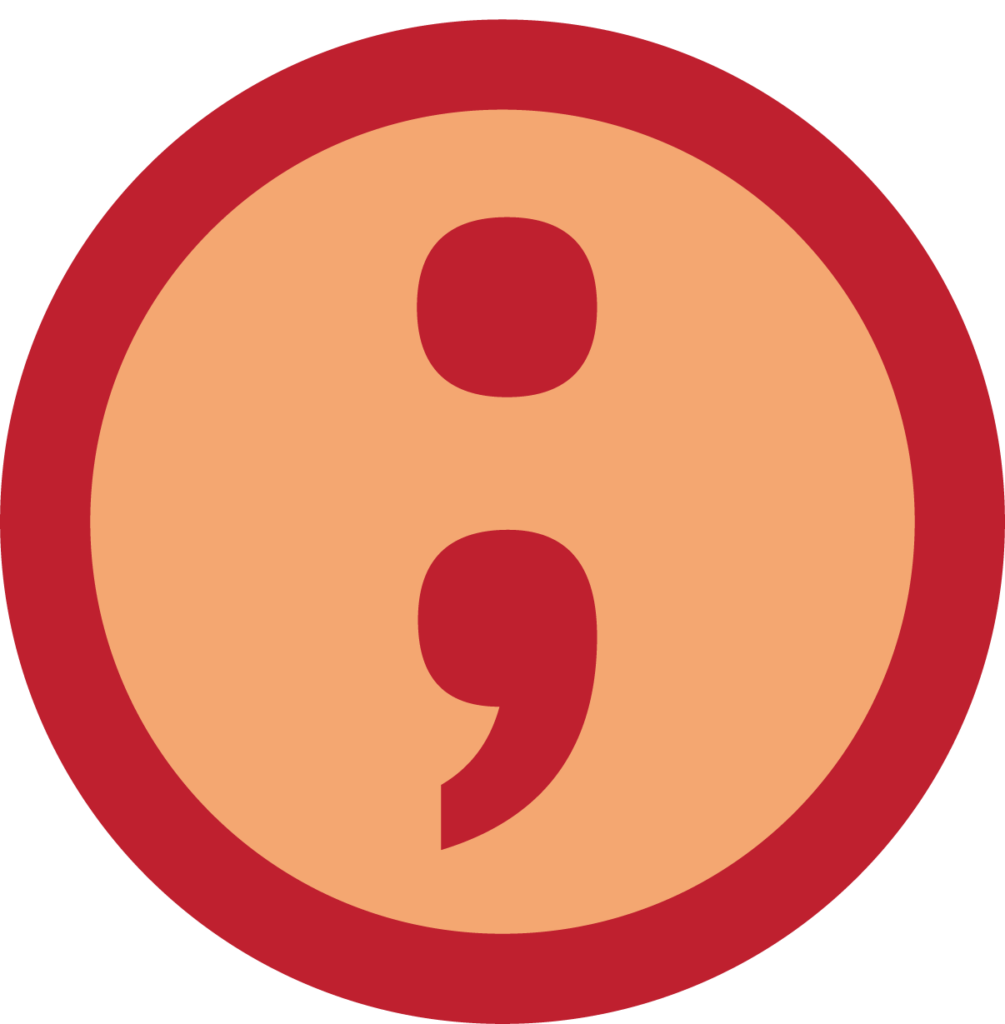Semicolons
There are only two cases in which to use semi-colons:
- to connect two complete sentences (two units of subject-verb-words to complete the thought) so as to avoid run-on sentences
- to separate items in a list within a sentence when the items themselves contain commas
For example:
- Anika’s statue is presently displayed in the center of the exhibit; this location makes it a focal point and allows it to direct the flow of visitors to the museum.
- As a photographer for National Geographic, Renato had been to a lot of different places including São Paulo, Brazil; Kobe, Japan; Kyiv, Ukraine; and Barcelona, Spain.
- As an engineering assistant, I had a variety of duties: participating in pressure ventilation surveys; completing daily drafting, surveying, and data compilation; and acting as a company representative during a roof-bolt pull test.
Colons
 Colons are used to:
Colons are used to:
- introduce a list after an independent clause/complete sentence – this is the most common use
- create emphasis
The colon is like a sign on the highway, announcing that something important is coming. It acts as an arrow pointing forward, telling you to read on for important information. A common analogy used to explain the colon is that it acts like a flare in the road, signaling that something meaningful lies ahead.
For example: (and this is one example of introducing a list)
- A compost facility may not be located as follows: within 300 feet of an exceptional-value wetland, within 100 feet of a perennial stream, or within 50 feet of a property line.
- To address this problem, we must turn to one of the biologist’s most fundamental tools: the Petri dish.
- In low carbon steels, banding tends to affect two properties in particular: tensile ductility and yield strength.
- The Petri dish is essential: it’s one of the biologist’s most fundamental tools.
Here’s one last detailed and useful review of semi-colons and colons.
Note: The content in this video is presented visually. You may listen to this video with audio description.
Practice: Semi-Colons & Colons
Are the semicolons and colons used correctly in the following sentences? Write your corrections and comments in the text frame below. The sentences have been numbered to aid in your comments.
 (1) The Antikythera mechanism is an ancient analogue computer likely used for several purposes including: predicting astronomical positions and eclipses and calculating Olympiads: the cycles of the ancient Olympic Games. (2) The device is a complex clockwork mechanism composed of at least 30 meshing bronze gears. (3) Its remains were found as one lump; it was recovered from a shipwreck, and the device was originally housed in a wooden box. (4) This lump was later separated into 82 separate fragments after extensive conservation work.
(1) The Antikythera mechanism is an ancient analogue computer likely used for several purposes including: predicting astronomical positions and eclipses and calculating Olympiads: the cycles of the ancient Olympic Games. (2) The device is a complex clockwork mechanism composed of at least 30 meshing bronze gears. (3) Its remains were found as one lump; it was recovered from a shipwreck, and the device was originally housed in a wooden box. (4) This lump was later separated into 82 separate fragments after extensive conservation work.
(5) The artifact was recovered probably in July 1901 from the Antikythera shipwreck off the Greek island of Antikythera. (6) Believed to have been designed and constructed by Greek scientists; the instrument has recently been dated to 205 BC. (7) After the knowledge of this technology was lost at some point in antiquity, technological artifacts approaching its complexity and workmanship did not appear again until the development of mechanical astronomical clocks in Europe in the fourteenth century.
(8) All known fragments of the Antikythera mechanism are kept at the National Archaeological Museum, Athens.
Candela Citations
- Semicolons and Colons. Revision and adaptation of the page Semicolons and Colons at https://courses.lumenlearning.com/wm-englishcomposition1/chapter/text-semicolons-and-colons/ which is a revision and adaptation of the page Semicolons, Colons, and Dashes at https://www.e-education.psu.edu/styleforstudents/c2_p5.html. Authored by: Susan Oaks. Provided by: Empire State College, SUNY OER Services. Project: College Writing. License: CC BY-NC-SA: Attribution-NonCommercial-ShareAlike
- Semicolons and Colons. Provided by: Lumen Learning. Located at: https://courses.lumenlearning.com/wm-englishcomposition1/chapter/text-semicolons-and-colons/. Project: English Composition I. License: CC BY: Attribution
- Semicolons, Colons, and Dashes. Authored by: Joe Schall. Provided by: The Pennsylvania State University. Located at: https://www.e-education.psu.edu/styleforstudents/c2_p5.html. Project: Penn State's College of Earth and Mineral Sciences' OER Initiative. License: CC BY-NC-SA: Attribution-NonCommercial-ShareAlike
- Modification of Antikythera mechanism (errors added). Provided by: Wikipedia. Located at: https://en.wikipedia.org/wiki/Antikythera_mechanism. License: CC BY-SA: Attribution-ShareAlike
- NAMA Machine dAnticythere 1. Authored by: Marsyas. Located at: https://commons.wikimedia.org/wiki/File:NAMA_Machine_d%27Anticyth%C3%A8re_1.jpg. License: CC BY-SA: Attribution-ShareAlike
- video Semicolons by Shmoop. Provided by: Shmoop. Located at: https://youtu.be/WMKufGCs1Ec. License: Other. License Terms: Standard YouTube License
- video Colons by Shmoop. Provided by: Shmoop. Located at: https://youtu.be/I12qwxQn5_s. License: Other. License Terms: Standard YouTube License
- video The Colon vs. the Semicolon - A Guide for Writers. Provided by: PublishNation. Located at: https://www.youtube.com/watch?v=Q1CQUivEths. License: Other. License Terms: Standard YouTube License